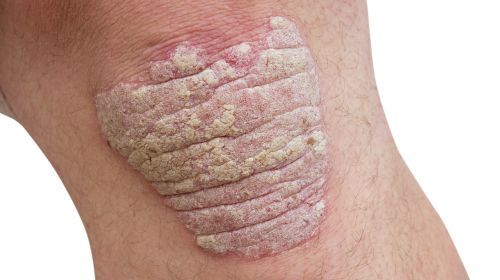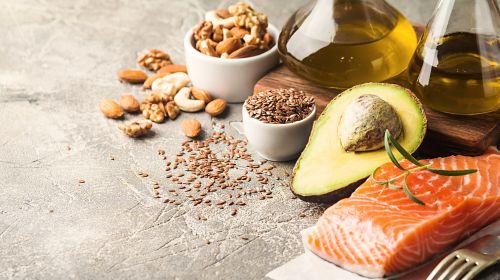Many sufferers ask themselves whether there is a proper diet for psoriasis. To date, no specific psoriasis diet is known, but excess weight should be lost and the diet should be varied. With these tips, an anti-inflammatory diet is easy to achieve.
- © rh2010 – stock.adobe.com
Quick overview: Frequently asked questions and answers
What shouldn’t you eat with psoriasis? People with psoriasis should avoid foods that can promote inflammatory reactions, such as highly processed foods, red meat, refined sugar, and alcohol.
Which foods trigger psoriasis? Certain foods, such as nightshades (tomatoes and eggplant), dairy products and products containing gluten, can trigger or worsen the skin condition in some sufferers.
What is missing from the body with psoriasis? There may be deficiencies in certain nutrients, particularly omega-3 fatty acids, vitamin D and antioxidants. They all have an anti-inflammatory effect.
Article contents at a glance:
Balanced diet for psoriasis
A diet and lifestyle adapted to the disease can have a positive influence on the course of psoriasis and, for example, alleviate symptoms in acute episodes. However, this cannot cure the skin disease.
Basically, a healthy and balanced diet is recommended. Above all, the menu should include:
- Whole grain products (be careful with grains containing gluten),
- Potatoes,
- fresh fruits and vegetables,
- Milk and dairy products (if tolerated),
- fish and
- vegetable oils.
These foods are rich in vitamins, minerals, antioxidants and long-chain unsaturated omega fatty acids. Antioxidants include plant-based colors and flavors and vitamins A, C and E.
Avoiding foods high in sugar as much as possible pays off, as does low alcohol consumption and avoiding smoking. Meat should also only be consumed in moderation. All of this can promote inflammatory processes.
Diet for psoriasis: Omega-3 fatty acids
Omega-3 fatty acids are long-chain, unsaturated fatty acids that are now known to have a positive effect on psoriasis in some people. They play an important role in the immune response and have an anti-inflammatory effect.
However, an increased intake or additional intake of omega-3 fatty acids only makes sense if animal fats from sausage and fatty meat are limited at the same time. They contain arachidonic acid, which limits the positive effect of omega-3 fatty acids. In order to reduce inflammatory processes, the foods mentioned should be avoided as much as possible.
The following are recommended for psoriasis patients:
- Vegetable oils such as linseed oil and rapeseed oil
- Algae and algae oil
- Fish oil
- fatty fish such as trout, sardines, tuna, herring
- Flax seeds, chia seeds, hemp seeds
- Walnuts
It is better to avoid arachidonic acid
The long-chain, polyunsaturated fatty acid from the omega-6 fatty acid group can promote inflammatory reactions in the body. It should therefore be avoided by people with psoriasis and other chronic inflammatory diseases such as psoriatic arthritis – but also as part of a healthy diet.
Omega-6 fatty acids are mainly found in:
- red meat and sausages, especially pork
- Poultry: Chicken meat and especially the darker parts such as thighs and wings
- offal such as liver
- Eggs, especially yolks (maximum two per week)
- butter
- fatty fish such as salmon and mackerel
Antioxidants are important for psoriasis
Antioxidants bind free radicals in the body and can render them harmless. In the skin inflammation typical of psoriasis, increased amounts of radicals are formed, which have a cell-damaging effect. People with psoriasis should therefore pay particular attention to an adequate supply of antioxidants.
The most important antioxidants are the colors and flavors in fruits and vegetables. Some vitamins also serve as free radical scavengers. Experts recommend eating a portion of fruit and vegetables at least five times a day – but the majority should be vegetables. It doesn’t matter whether the portion is fresh or frozen.
Nuts are also good sources of antioxidants. However, since they also contain a lot of fat, they should only be eaten in small quantities. A good guideline is the recommendation of a maximum of 25 grams (about a handful) from the German Nutrition Society. This can also be used to replace a portion of fruit.
Avoid alcohol and nicotine
Some people react with an intolerance to food. If you are aware of an intolerance to certain foods, they should be avoided. However, there is no statement that applies to all patients as to which foods should generally not be eaten. People with psoriasis often react
hot spices such as chili, pepper or curry,
citrus fruits or
pickled foods.
The situation is different with alcohol and nicotine. They have been proven to have an unfavorable effect on the course of psoriasis in most people. It is therefore recommended that people with psoriasis avoid alcohol and give up or at least limit smoking.
Are nutritional supplements useful for psoriasis?
It is best to eat a balanced diet and ensure that the basic rules of a healthy diet are followed. A chronic inflammatory disease such as psoriasis is usually associated with an increased consumption of certain antioxidants such as vitamin C. As long as enough fruit and vegetables are consumed, additional intake is usually not necessary.
Things are a little different with omega-3 fatty acids. To get enough omega-3 fatty acids, you need to eat around 200 grams of fatty fish per week. Especially for people who don’t like fish or follow a vegetarian or vegan diet, it can make sense to increase their omega-3 intake through dietary supplements. However, it takes weeks to months until a correspondingly high level is reached in the blood.
Taking it in natural form is preferable to taking dietary supplements. In addition, if possible, you should consult a doctor beforehand.
Vitamin D and psoriasis – connection still unclear
The effectiveness of oral vitamin D supplementation in psoriasis patients is currently unclear, as current research results have not found significant improvements in symptoms. There is currently a lack of large-scale studies to precisely determine the optimal dosage and potential side effects.
Although those affected have lower serum levels of 25-hydroxyvitamin D, no significant improvement has been demonstrated by taking vitamin D supplements. Further research is needed to identify specific groups that may benefit from supplementation.
Reduce excess weight if you have psoriasis
If you are overweight, losing weight is always desirable and can best be achieved with a healthy diet, sufficient exercise and sport. A zero diet is not recommended as weight gain often occurs again after fasting (yo-yo effect). In addition, rapid weight loss releases a lot of arachidonic acid, which can have an inflammatory effect.
In the long term, carefully planned and continuous weight loss can be expected to benefit your general well-being and your skin. Studies have shown the positive effects on the course of the disease and the effectiveness of the treatment through weight normalization. It is very important to also have the thyroid examined. It should be clarified whether there is an underactive thyroid (hypothyroidism), which promotes obesity.
Since psoriasis carries the risk of certain comorbidities such as diabetes mellitus or an increased risk of a heart attack, it makes all the more sense for psoriasis patients to reduce these risks through a healthy and balanced diet.



